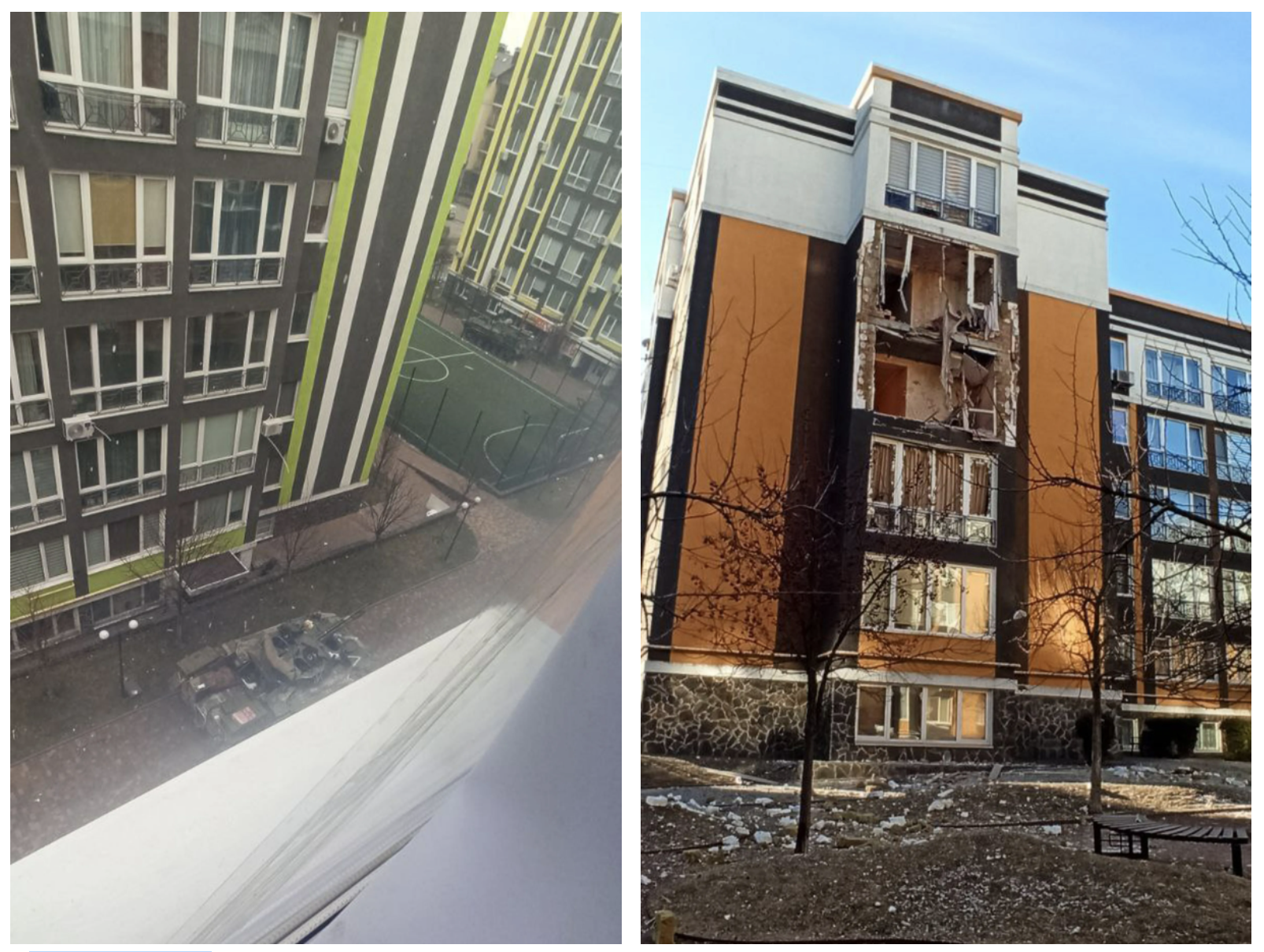The war in Ukraine has been going on for two months. According to OVD-Info, an independent Russian human rights media initiative, during this time 15.5 thousand people were detained in Russia during anti-war protests. The most active Russians took to the streets in the first weeks of the war. The record for the number of arrests — 5,558 people in 77 cities — was on March 6. OVD-Info says security forces threw the protesters on the asphalt, beat them with batons, choked them, beat them in the stomach, in the face, hit their heads against the wall and wringed their hands.
At the moment, OVD-Info reports on 84 defendants in criminal cases, 26 of whom are charged under a new law against the public dissemination of knowingly false information about the use of the Armed Forces of the Russian Federation (Article 207.3 of the Criminal Code of the Russian Federation). Those charged face up to 15 years in prison. Another thousand protesters were arrested by the courts.
People are detained for posters with quotes from the Bible (“Thou shalt not kill”) or from Putin’s speech at the Victory Parade on May 9, 2021 (“The war brought so much grief that it is impossible to forget it. There is no forgiveness for those who again plot aggressive plans”), ham "Miratorga", the phrase "No to war", "Two words", a poster with asterisks instead of words ("*** *****"), a blank sheet, the flag of Ukraine or for sneakers in the colors of this flag.
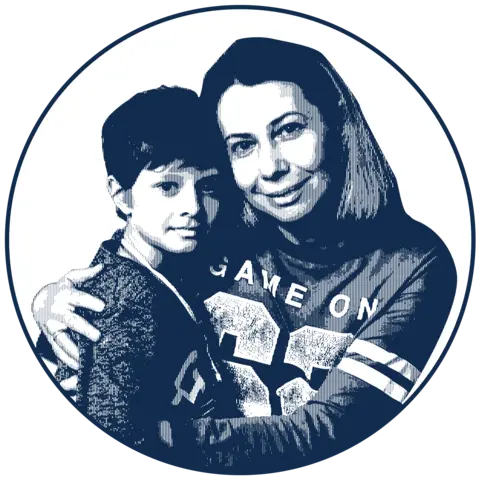
As a nonprofit journalism organization, we depend on your support to fund coverage of global conflicts. Help us continue funding the hard costs of in-depth coverage of the Ukraine invasion—including travel, hostile environment safety training, and the increased security expenses that arise from reporting in war zones.
For open disagreement with the war, posting anti-war leaflets, or even for wearing black clothes and a white rose in your hand, neighbors, acquaintances, students and colleagues denounce those who disagree with the police.
Despite the denunciation, the cruelty of the security forces, the new criminal and administrative articles, the absence of mass rallies, people of different ages and professions remain in Russia, who unite in “partisan” anti-war resistance, organize actions against Russian aggression, come out with “silent pickets”, hang leaflets , draw graffiti, tie green ribbons, or simply give away dystopian novels for free.
"Important stories" learned why they continue to protest in Russia, whether they believe in the possibility of stopping the war, and changing the country for the better with "quiet" partisan actions.
Daria Heikinen
“I can still leave Russia, but I am not leaving.”
Daria Heikinen, an 18-year-old TikTok blogger and head of Mayak, the opposition socio-political movement in St. Petersburg. Mayak openly opposes the war, informs subscribers, and creates petitions.
I woke up on February 24 at 9 am from the fact that they started calling me. It turned out that the guys from the [Mayak] movement called because they did not understand what to do. And it was clear. I woke up too and didn't know what to do. I went to bed with the thought that nothing would start, because how is this even possible. The first few hours I was in shock.
Then it became clear that if we manage to organize some kind of large-scale rally on that day, then perhaps this will bring results: This is the first day of the war and people are very aggressive towards it. Therefore, we were one of those who announced the evening action. And then the police came to my residence on the same day, so it was dangerous for me to go to this action. But in the end, I went anyway: Three times I was within a hair's breadth of detention, but I was lucky.
In the early days, we [the Mayak movement] were mainly engaged in informing. I had just left the IVS [temporary detention center], and it was difficult to organize any actions, because there was a threat to sit down above me. Now we are testing the ground under ourselves: We are creating petitions, for example, demanding that information about those killed on the cruiser Moskva be made public.
On March 5, they came to me with a search in the criminal case of “telephone terrorism” ( Article 207 of the Criminal Code of the Russian Federation. - Note ed. ), but no charges have yet been filed. I think the goal was precisely to withdraw all the equipment, so that it would be more difficult to continue working, and to keep it in the temporary detention facility for two days, because a large anti-war action was just planned for March 6th.
I can still leave Russia, but I am not leaving, because for me it is a principle: If the authorities try to expel me or silence me, then I will not do it on principle. This is part of my inner protest. This is my homeland, I was born here, I lived here, I didn’t go abroad very often. Since the beginning of the war, they have written on my door twice, doused it with paint, filled the locks with polyurethane foam, and left feces under the door. They wrote on the door that I was a Finnish Nazi, because I have a Finnish surname, and threats like “Wait, we are nearby.” I think this is such an act of pressure that I just left the country.
I do not feel that there are few people who are against the war. Sociological surveys obviously do not work in such a situation, because we have a criminal article even for the word “war”. Maybe I'm in an information bubble, among people who stay in the country and somehow fight or fight from abroad. So I don't feel [lonely]. Maybe that's why I keep doing it.
I understand that if they want to fabricate a case against me, they will fabricate it. But I take it as inevitable, and the inevitable must be treated with indifference. Especially in Russia, which we now see: If you are engaged in anti-war activism, the chances that you will be opened a criminal case are greatly increased. So I try not to take it personally until it happens.
Tatyana Savinkina
“Well, yes, they will judge me, they will imprison me or fine me — they don’t give a damn”
Tatyana Savinkina, 77, pensioner and social activist from Petrozavodsk. Hangs out leaflets with the text "Putin, get out of Ukraine."
I have no doubt that our country committed a crime, and with it all of us, by attacking a neighboring country. How dare Putin commit such a crime? After all, all our lives we said: “The most important thing is that there should be no war!” Therefore, I decided that I should do this [put up flyers].
I have a husband there [in the city of Belaya Tserkov, Kyiv region]. He graduated from high school there and spent a lot of time there. Then he studied in Russia and worked here [in Petrozavodsk] in the government. We parted with him, but we communicate very often.
The husband woke up in the morning, at half past five, February 24, from a roar. I looked out the window, and there they blew up the airport. He, along with his housemates, lived in basements for 8 days. Our daughter was looking for a long time how to get him out of there. But he said, “No, I will stay. I will stay like everyone else. I won't hide." He has been in Ukraine since 1996, he believes that these are his people now, although he came to Russia every year.
Because of the leaflet “Putin, get out of Ukraine” hung out in the elevator, the chairman of the HOA informed me. Judgment will be next week. Now I [in my house] post every day letters to her. I am writing that I am very ashamed of you, because thanks to such denunciations in the 30-50s, a huge number of people were arrested and shot in our country. I used to work in the Ministry of Internal Affairs, was engaged in the rehabilitation of [convicted] people, and I saw such denunciations.
But I keep putting up [flyers]. There is no heroism here. This should be an ordinary human attitude to what our country has done. Well, yes, they will judge me, they will imprison me or fine me - they don’t give a damn. It is important for me [to continue protesting], despite the risk of getting jailed. In trolleybuses, if I go in and see, I shoot posters for charity concerts in support of our army. Someone will be indignant, and someone will say, "That's right." The woman and I talked so much in an almost empty trolleybus that not only Ukrainians are dying, but ours too. The driver heard us and screamed directly, without turning to face us: “What are you, fools? Why are you against the Motherland?" Well, that's it, we are fools.
I really hope people start waking up. And I start conversations on the bus, for example. And many say, “Well, what? If it wasn't for us, America would have attacked." The people are muzzled by this television in such a way that it is simply a shame to listen to them. This makes me feel very lonely. Even many relatives believe that war is right. I try to talk, to tell something, but no one is interested in it. They say, “What, do you need it most of all?” And I need!
“I want to show people that there is resistance in Russia”
Artist and activist of the "Feminist Anti-War Resistance" from the Sverdlovsk region, 27 years old. She has requested that her name will not be made public.
On the second day of the war, the Feminist Anti-War Resistance (FAS) appeared, and I began to participate in the actions that they invented. I put up leaflets at bus stops with the text “No to war”; “For peace”; “This is not a special operation, but war.” I leave [anti-war] messages on money, because they go from hand to hand and people see these inscriptions. I try to do it all in a different style, so it's harder to guess if it's done by one person or several different people.
There was also the action “Mariupol 5000." people in Ukraine buried their loved ones right in the yards, put crosses on graves, and we in Russia also put crosses at houses. Someone wrote facts about crimes in Mariupol on them. I didn't use any numbers, because I know that when you use supposedly unconfirmed facts, for example, you write the number of dead, then there can be very serious consequences for this.
Therefore, I wrote more abstract things on the crosses — "Future" or "For what?" Other people began to send me photos of the crosses that they put up, and I sent them to the FAS. After that, the Federal Antimonopoly Service called me to figure out how else to hold actions, but I have not yet managed to do anything in this direction, because they just drew up an administrative report on me for the “Women in Black” action. I walked around the city in black clothes with a white rose. Probably, someone saw my photo in the FAS social networks, recognized it and reported it. Now I am waiting for the trial [for "discrediting" the Russian military (20.3.3. Administrative Code)].
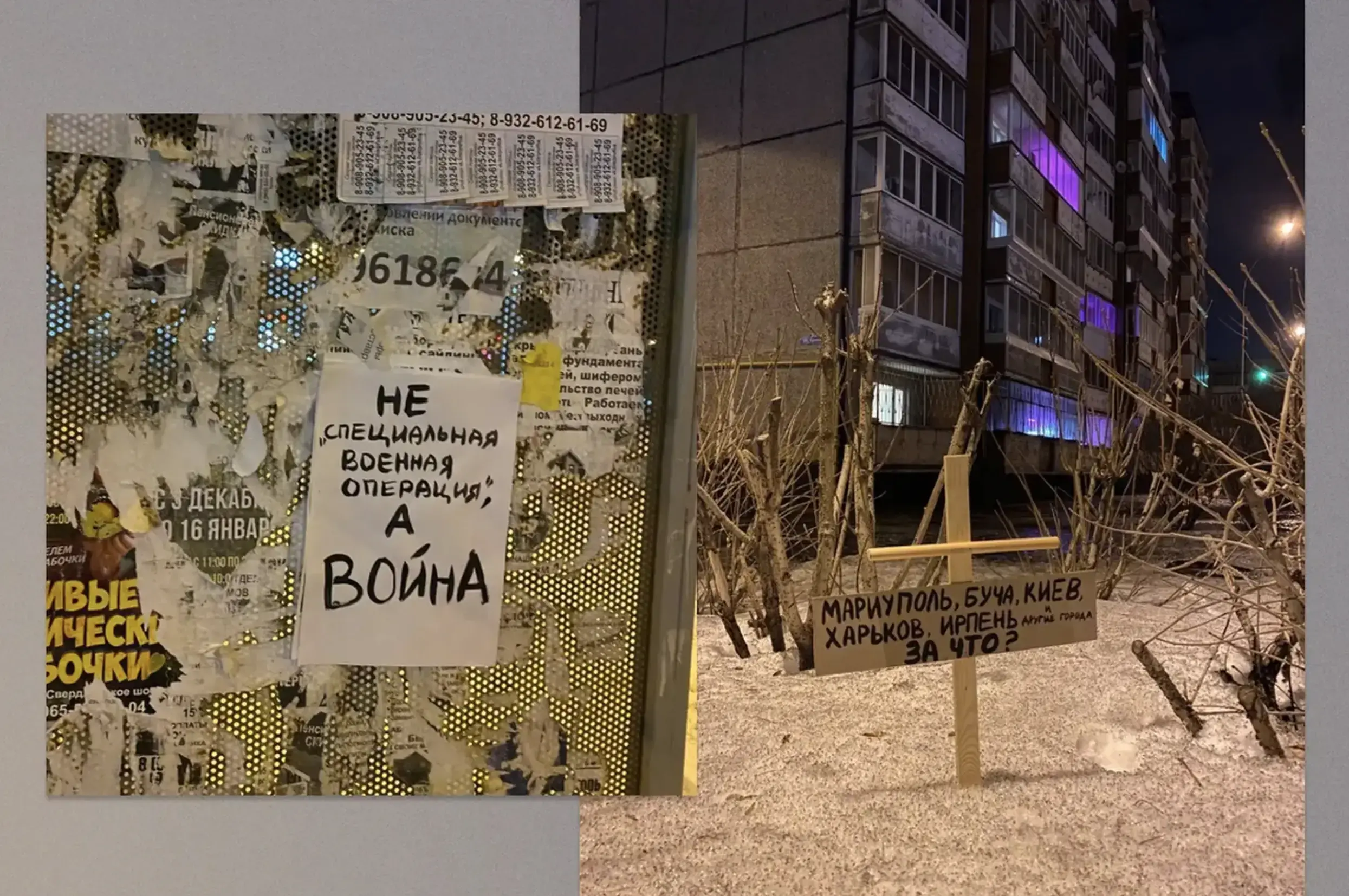
But even now I continue to express my opinion on social networks. I have 90 thousand subscribers on Instagram. And I continue to look for some new forms of protest and at the same time remain free. I think I'm a more useful person when I'm free.
I just can't do it any other way, there is no other way out. Life is divided into before and after, I cannot live the way I lived before. I want to show people, the whole world, that there is resistance in Russia, that we are not silent, we are trying to do something. Our regime is bad, we have a very difficult situation inside the country, but nevertheless, neither before nor now has there been a situation in which absolutely all people in Russia support power. It's important for me to show it. I have friends in Ukraine, I want to support them, express solidarity. But my struggle is also for Russia, so that there are no more such situations in which we now find ourselves.
All my friends are absolutely on my side, here I feel unity. There is a feeling that this “majority”, which supports the authorities, is very exaggerated, that they are trying to make us believe that such people are in the majority. It seems to me that there are actually a lot of people who are against it. It's just that some people are more active and some are less.
We have different opinions in the family. It is difficult to say that my mother is for the war, this phrase cuts very painfully. She supports Putin. However, if I ask my mother: “Mom, are you for the war?” she will say “no,” but she will begin to explain that this is a necessity, that they are lying to us, that there are no victims, and so on. Someone stops communicating with both parents and children, my friends simply have families destroyed. But it will be better for me if I do not stop communicating with my mother, despite the fact that we have different views. She worries about my safety, tries to tell me not to protest so directly, but does not impose it. She tries, if not to understand me, then at least to accept.
Sometimes it seems to me that everything is in vain, nothing will help at all. And then I think that there is still hope, as long as there are such people. So I just keep doing it. I try not to think too much [about the results], because I'm afraid to come to the conclusion that it is unlikely that I will be able to change anything. We need at least someone to stay [in Russia] to try to bring our country closer to something bright. I don't know if it will work, but I would like to be a part of it.
“Well, how can you say that we are a minority when they put us in jail for the word “war”?
Anonymous organizer of the all-Russian flash mob "Green Ribbon".
Flash mob participants tie a green ribbon on the streets as a symbol of peace and in protest against the war with Ukraine.
The idea of the Green Ribbon flash mob emerged on February 26 as a reaction to calls from opposition leaders to rally against the war. Already the first mass meetings in St. Petersburg near Gostiny Dvor showed that the organization of rallies is lame: The security forces always know the place of the meeting in advance and are ready to suppress any mass demonstrations with a numerical advantage. In the Telegram chats of the opposition, disappointment reigned and further formats of the struggle were discussed: How to be and what to do. Then the idea of a distributed partisan protest arose, where everyone can independently be an active link, without waiting for a decree or an organizational decision. Everyone is a warrior in the field.
Tying a ribbon is a minimally risky act, a safe way to speak your mind in a country without freedom of speech. People who never knew about the tape before, but saw it on the street, Googled it, found our page and wrote to us, “It's great that there are adequate people in Russia.” They get acquainted in the comments, get support, understand that they are not alone. Just a couple of days ago, a subscriber wrote to us and decided to hang a tape. In the park I saw a man who also hung ribbons. There are many of us and there are people everywhere.
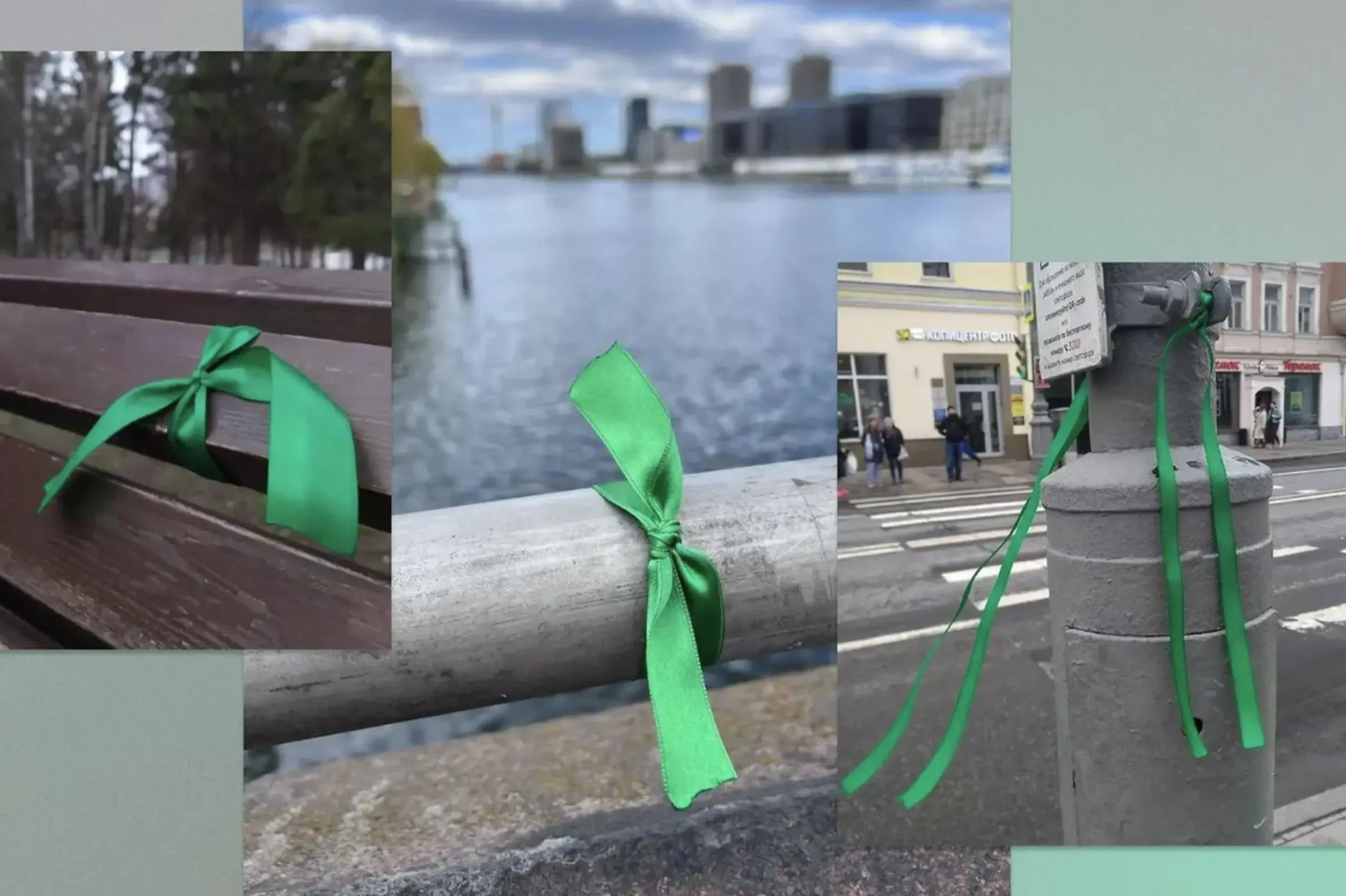
If we compare the number of photos of green ribbons that were sent to us at the beginning of the launch of the campaign and now ... Today we do not have time to publish everything. Mostly people aged 25-45 participate, judging by the statistics of subscribers. Most of all, of course, from million-plus cities: Moscow, St. Petersburg, Yekaterinburg. Green ribbons hang even in New York, London and the Seychelles.
For now, our plan is to include as many people as possible in the resistance. The green ribbon is the first step, the initiation. When it becomes mass for millions, then there will be prerequisites for change. As long as everyone sits at home quietly and silently, there will be no revolution in Russia. Many want to protest, but they are afraid, because they do not know any other forms, except for rallies. Our goal is to encourage millions of people to take a simple and safe action: Take and tie a ribbon! Having taken the first step, a person becomes bolder, overcomes passivity, turns on. Then you want something more, some different promotions. The main thing is to stir up the citizens.
Well, how can you say that we are a minority when they put us in jail for the word "war"? No survey results will be valid under such conditions. People who are against the war are afraid and intimidated, therefore they are often silent and do not stick their heads out. This is one of the goals of our action — to "talk" people through a green ribbon.
We ourselves are in Russia and we are not going to leave. Are we scared? Yes, scary, of course. War is basically scary. It is foolish to think that people's deaths can be stopped in comfortable conditions.
Dmitry Silin
“If at least someone thinks and starts to be a little less afraid, that’s good.”
Dmitry Silin, 52, businessman from Ivanovo.
Distributes dystopian novels 1984, by George Orwell, and We, by Yevgeny Zamyatin, on the streets of the city for free.
Somewhere since mid-April, together with my assistant, lawyer and blogger Anastasia Rudenko, we have been handing out books containing two novels at once — 1984 and We. I buy them with my own money. We have already gone out 7-8 times and distributed about 400 books. Mostly students take them, because we distribute them not far from universities. People over 30–35 rarely approach, turn away and walk past. And students perceive our charitable action very positively, they take books. We were surprised that about half of them said they had already read 1984. Of the remaining half, about 25% heard and wanted to read, and only 25% did not hear.
Suitable mainly with questions: "What kind of book?" "Why are you handing out?" We say we just want people to read more, watch less TV, and have people form their own opinions. This book, I think, makes people think about something. I myself read 1984 quite by accident about five years ago. "Room 101" [torture chamber] scared me then. An interesting world ... Becomes similar to ours. I decided that now it is necessary to give people the opportunity to read it, so that they begin to think about something for themselves. If at least someone thinks and starts to be a little less afraid, that's good.
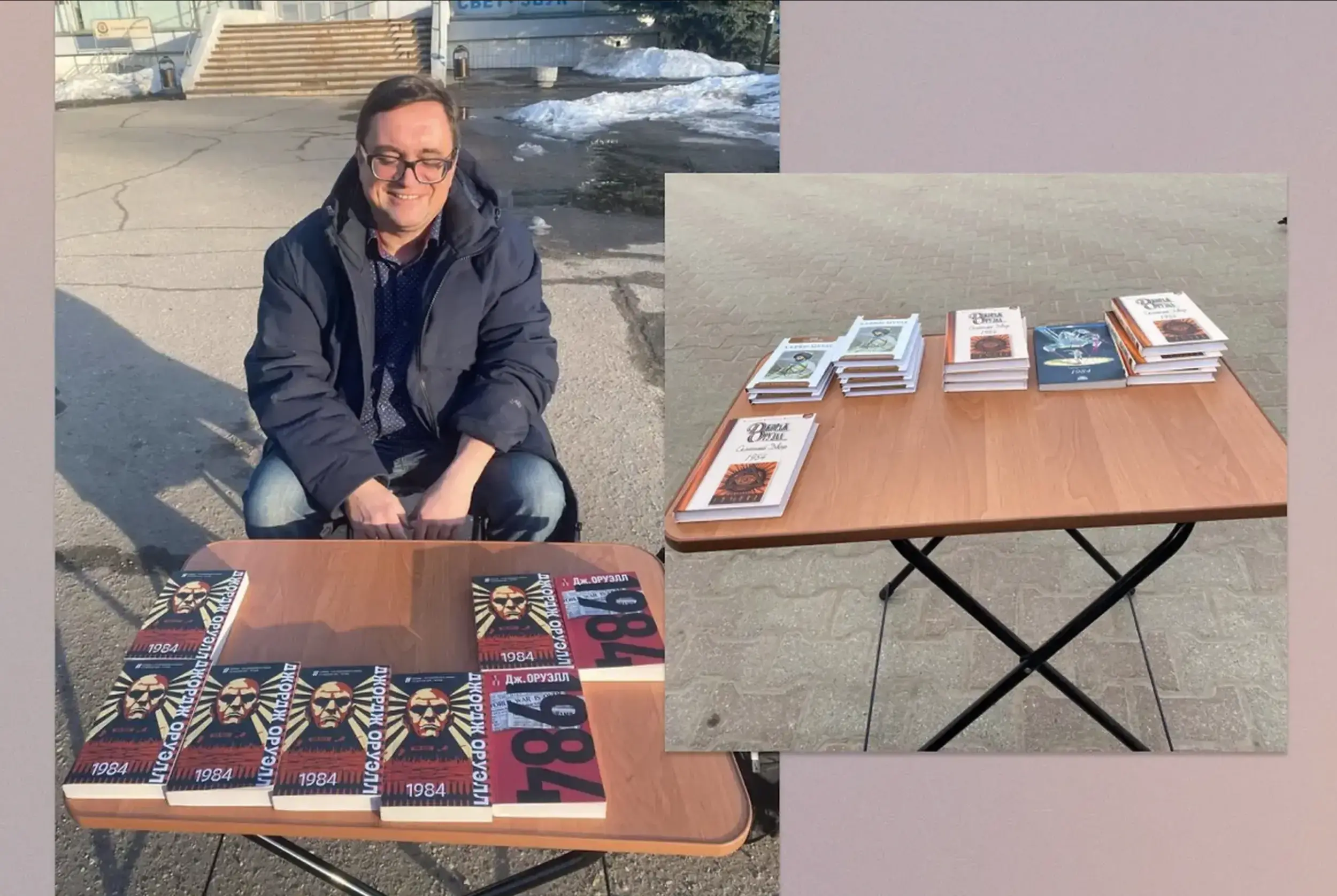
The first time was a little scary to go out. It was difficult for the first time to take a table, a chair, a bag of books and go out. No one took me anywhere with these books. If they take me [to the police station], then they need all the bookstore salesmen. Sometimes they ask who sends you these books. I say that there is no politics here, these books are sold in any bookstore. I have always been far from politics, practically did not participate in any events. I treat the Russian state with restraint, I have nothing against it. My companies have always worked exclusively on government contracts. I live here, I work here, and I'm not going anywhere. But I just think that something needs to be done in this situation.
I am amazed at the indifference of people. That people in 30 years pass by, wave their hand, turn away. They are preoccupied with their own problems, rising prices, family, children, and so on. Alive, salaries are paid, well, less, but there is, and there is something to eat. Therefore, it’s better not to get involved in anything at all, they don’t want to be involved in anything, to be involved in anything — they live and live. It's easier for them. People have been taught to live like this for years. People are tired and do not want anything, they live in their shell. And young people are interested, I was surprised by their position. None of them said anything bad to me. All hope is on them.
Anush Panina
“Well, how much can you? Stay away like this for the rest of your life?"
Anush Panina, Petersburger, 35 years old.
Anush organized an anti-war performance on Sennaya Square in St. Petersburg. She was fined 40,000 rubles and detained for 10 days.
At an anti-war rally on February 24, I first shouted “No to war” when the riot police turned away in the other direction. But then I got tired of standing somehow so far away from them that I wouldn't be detained. ( Anush was detained twice at other protest actions. - Approx. ed. ). Well, how much can you? Stay away like this for the rest of your life? I began to approach the riot police and people without identification marks, looked into their faces, asked how old they were. And at some point, the whole crowd began to shout "No to war." And I was just next to the riot police, at a distance of about five meters, almost eye to eye with them, and I also screamed.
After I was released on March 4 ( Anush received 8 days of arrest for participating in an anti-war rally on February 24. - Ed. ), I realized that I wanted to do something active. A friend of mine came up with the idea for posters similar to prostitution ads: In capital letters female names like "Lyuba" and then in small letters, "will live without a father." My friend and I had a long discussion about whether this would be considered discrediting [the Russian army]. I was scared. I understood that I would go out and be imprisoned, most of all I was afraid that they would beat me. But I will have time to photograph and it will catch the eye of many people. So I didn't want to waste this attempt, but to write something that would shake people's minds, something that would penetrate them.
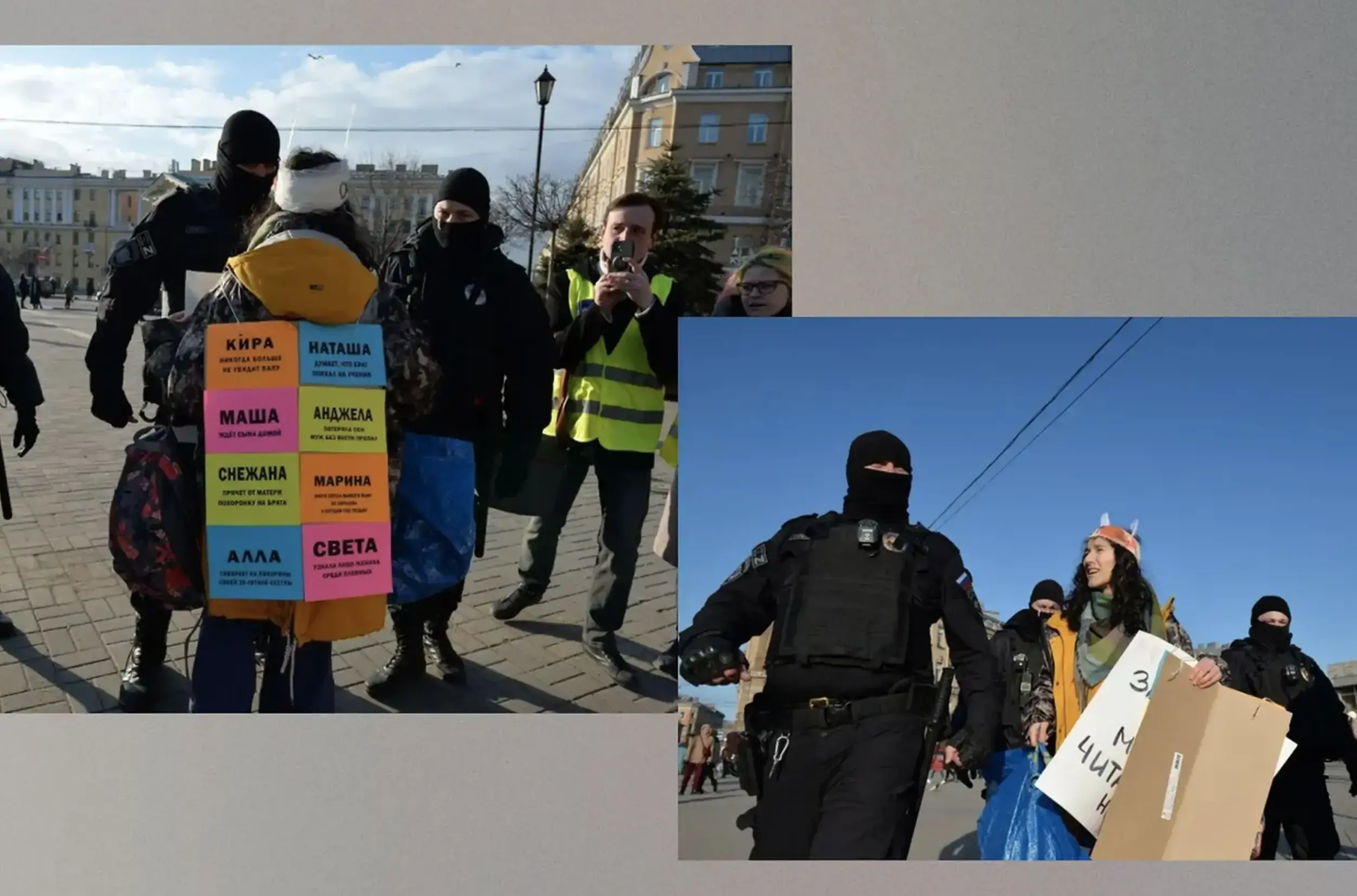
I wanted people to think, “Oh, is she talking to us?” so that it was a kind of dialogue, and not just my saying “Stop the war.” And it happened! Even at the police station, for some reason, they didn’t take away my bandage on my head with blood and the question “How much?” and did not include it in the protocol. They asked what kind of feathers: “Is this an Indian?” I explained that this is the ancient Greek god Hermes — the guide of souls from the world of the living to the world of the dead. And the inscription on the poster "We are naive" — that in Russia there are thousands of layers of this naivety at completely different levels and on different scales. Some do not imagine that there are political prisoners, the second do not imagine that a riot policeman can beat someone at a rally, and not hand out cookies. Still others don't know where Mariupol is, others say that it's not a shame to be raped, but it's a shame to rape ...
Now I am waiting for the appeal and I hope that I will be acquitted, then I will be able to come out again with some kind of artistic statement, public reflection. At the same time, I think about what documents I will need to collect and what things to take with me in case of departure, if a criminal case is opened against me.
Marina Antonova
“Now the authorities are waging two wars at the same time: One is here with us, the other is in Ukraine.”
Marina Antonova, artist and Instagram blogger from Moscow, 33 years old.
On the very first day of the war, Marina painted a picture - a dove of peace against the background of the flag of Ukraine - and went on a "quiet picket": she decided to ride public transport with the picture so that people would pay attention to her. On that day, people had not yet been “screwed up” en masse, so Marina walked with a picture in crowded places, took pictures of herself and posted anti-war posts on social networks. After mass detentions, arrests and fines began, the artist continued her "quiet pickets" in remote areas of Moscow.
“People come up to Marina in transport and they usually have two types of reactions: either they just don’t notice anything, as if they are an ordinary passenger, or they say that they are also against [the war], they say that it’s cool, respect, they wave their hand support from afar. Sometimes she has conversations with people, while others hear it all. Maybe it makes them think about something. Not once did anyone come up and say that they supported the war, no aggression or criticism. At most, someone looks with incomprehension, why she is sitting with such a large picture,” the artist’s friends say.

Marina conceived this small gesture to maintain a common spirit in a situation where doing something big is very dangerous, but doing nothing is impossible. “Now they [the authorities] are waging two wars at the same time: One here, with us, the other in Ukraine. It is important for them to exclude from society those who are against the war. It is impossible to say for sure whether the “silent picket” will lead to something more, but it is important that those who disagree [with the war] have the feeling that they are not alone.
"When you walk around the area and see [anti-war] graffiti, you understand that there are people you don’t know at all who are also against it. And people are uniting to raise money for the Ukrainians, they were able to find a way to send it. Let there not be huge amounts, but at least something. The very fact that people generally unite for the sake of protest, even a small one, is very important."



